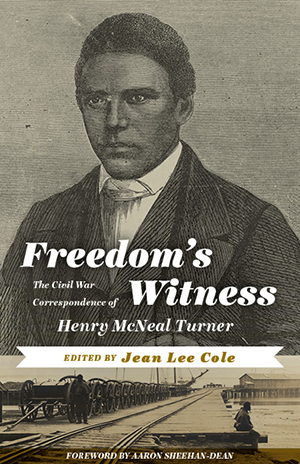Freedom’s Witness: The Civil War Correspondence of Henry McNeal TurnerPosted in Books, History, Media Archive, Monographs, Slavery, United States on 2013-12-27 01:23Z by Steven |
Freedom’s Witness: The Civil War Correspondence of Henry McNeal Turner
University of West Virginia Press
March 2013
288 pages
Hardcover (Jacketed) ISBN: 978-1-935978-60-2
Paperback ISBN: 978-1-935978-61-9
ePub ISBN: 978-1-935978-62-6
PDF ISBN: 978-1-935978-95-4
Foreword by:
Aaron Sheehan-Dean, Fred C. Frey Professor of Southern Studies
Louisiana State University
Edited by:
Jean Lee Cole, Associate Professor of English
Loyola University Maryland, Baltimore
In a series of columns published in the African American newspaper The Christian Recorder, the young, charismatic preacher Henry McNeal Turner described his experience of the Civil War, first from the perspective of a civilian observer in Washington, D.C., and later, as one of the Union army’s first black chaplains.
In the halls of Congress, Turner witnessed the debates surrounding emancipation and black enlistment. As army chaplain, Turner dodged “grape” and cannon, comforted the sick and wounded, and settled disputes between white southerners and their former slaves. He was dismayed by the destruction left by Sherman’s army in the Carolinas, but buoyed by the bravery displayed by black soldiers in battle. After the war ended, he helped establish churches and schools for the freedmen, who previously had been prohibited from attending either.
Throughout his columns, Turner evinces his firm belief in the absolute equality of blacks with whites, and insists on civil rights for all black citizens. In vivid, detailed prose, laced with a combination of trenchant commentary and self-deprecating humor, Turner established himself as more than an observer: he became a distinctive and authoritative voice for the black community, and a leader in the African Methodist Episcopal church. After Reconstruction failed, Turner became disillusioned with the American dream and became a vocal advocate of black emigration to Africa, prefiguring black nationalists such as Marcus Garvey and Malcolm X. Here, however, we see Turner’s youthful exuberance and optimism, and his open-eyed wonder at the momentous changes taking place in American society.
Well-known in his day, Turner has been relegated to the fringes of African American history, in large part because neither his views nor the forms in which he expressed them were recognized by either the black or white elite. With an introduction by Jean Lee Cole and a foreword by Aaron Sheehan-Dean, Freedom’s Witness: The Civil War Correspondence of Henry McNeal Turner restores this important figure to the historical and literary record.
Table of Contents
- Editor’s Note
- Foreword, Aaron Sheehan-Dean
- Acknowledgments
- Introduction: “I have seen war wonders”: The Civil War Correspondence of Henry McNeal Turner
- Chapter 1. Emancipation and Enlistment (March 22, 1862–April 18, 1863)
- Chapter 2. The Siege of Petersburg (June 25, 1864–December 17, 1864)
- Chapter 3. Fort Fisher (Jan. 7, 1865–Feb. 18, 1865)
- Chapter 4. Freeing Slaves, Meeting Sherman (Feb, 25, 1865–June 10, 1865)
- Chapter 5. Roanoke Island (June 24, 1865–August 5, 1865)
- About the Authors
